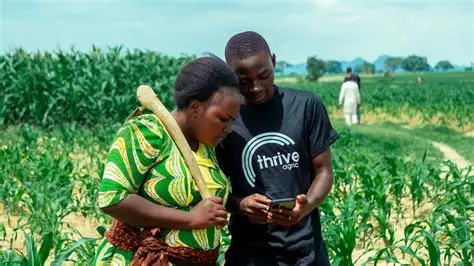Agriculture is as old as man itself, rooted in creation, provision, and sustenance. But with the rise of formal education, urban migration, and white-collar aspirations, farming in Africa became stigmatised. It was branded a “dirty job,” dismissed as backward, and passed over by youth chasing digital futures. That narrative is finally beginning to shift.
Agritech Remains Small but Mighty
In 2024, African agritech startups raised just US$89 million across 30 deals, a 38 per cent drop from the previous year, according to Partech. Yet beneath the slump lies a striking fact: 51 per cent of that funding went to female-led ventures.
In a year when venture funding across the continent contracted sharply, agritech remained one of the few sectors attracting capital with purpose. Investors are backing startups solving real-world challenges such as food insecurity and climate adaptation, particularly those embedded in rural livelihoods.
The ThriveAgric Model: Youth, Tech and Climate
This renewed interest is being driven by a new generation of founders who never saw agriculture as outdated. They saw it as underbuilt and ready for innovation.
Uka Eje, CEO and co-founder of ThriveAgric, is one of the sector’s most visible leaders. His company helps farmers access financing, inputs, agronomy advice, and guaranteed buyers through its proprietary platform, Fida. ThriveAgric says it has reached over 514,000 smallholder farmers across Nigeria, Ghana, and Kenya.
In 2024, the company launched a climate-smart pilot with 30,000 farmers, combining fruit trees with traditional crops to generate carbon credits. The programme, developed in partnership with Rabobank, aims to scale to 200,000 farmers by 2027.
“The government should be a partner in creating an environment where agritech can thrive,” Eje told ThriveAgric’s Hectare Journal. “This means providing access to the right infrastructure, financing, and a solid storage and transport network.”
ThriveAgric’s growth reflects a broader funding trend. Investor interest is shifting towards agrifintechs and digital marketplaces that improve efficiency across entire value chains.
According to Briter Bridges and AgFunder, agrifoodtech investment in Africa during 2024 concentrated heavily on platforms like these. Marketplaces and agrifintechs made up 41 per cent of all deal volume. These models offer scale, replicability, and measurable impact, especially in low-infrastructure settings.
Meanwhile, climate-tech continues to accelerate across the continent, with over US$2.9 billion raised across more than 460 deals. Agritech is becoming central to this ecosystem, not a fringe player.
A New Generation Is Watching and Building
For Africa’s young population, agritech offers what traditional farming never did: purpose, data, visibility, and the ability to scale. On university campuses and in coding bootcamps, the farmer is being redefined. Sometimes as a drone pilot. Sometimes as a climate activist. Often as a startup founder.
Platforms like AYuTe NextGen and community-based innovation hubs are helping to transform agriculture into a viable tech path. The sector is no longer just growing crops. It is growing credibility.
If momentum continues, upcoming events like Agritech West Africa in Accra could showcase a new generation of builders with soil under their nails and software in their hands.
Africa’s future farmers are not just here to feed the continent. They are here to digitise it.















